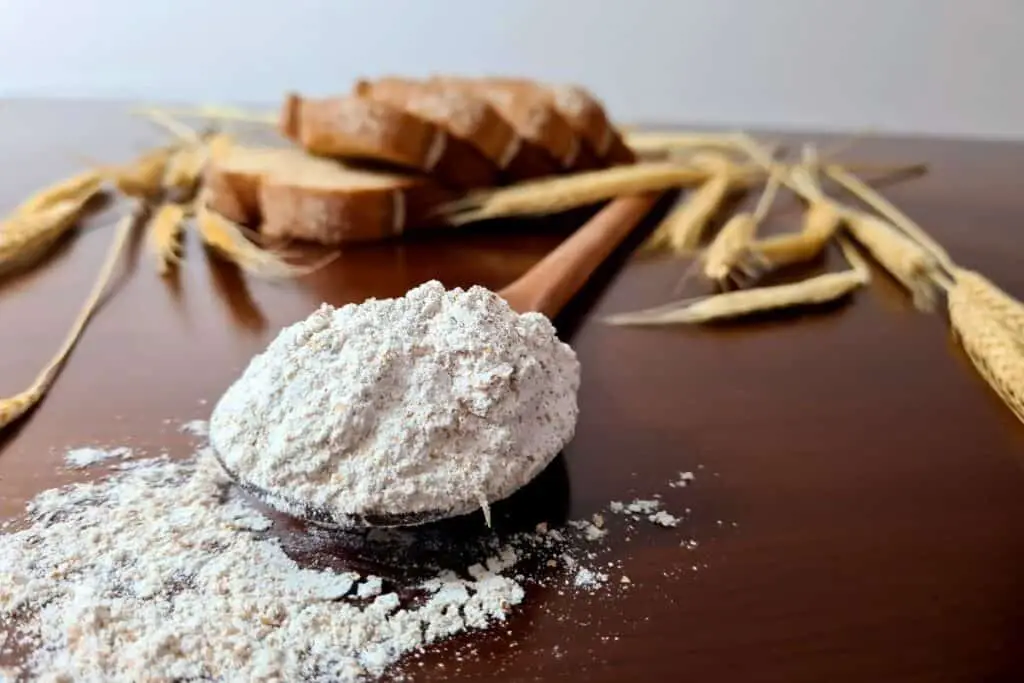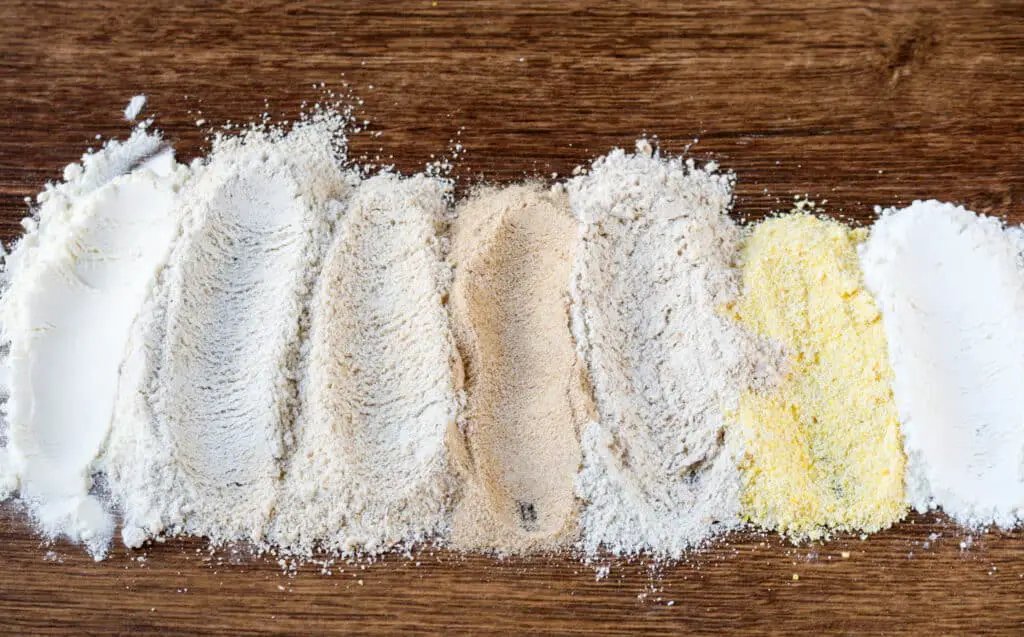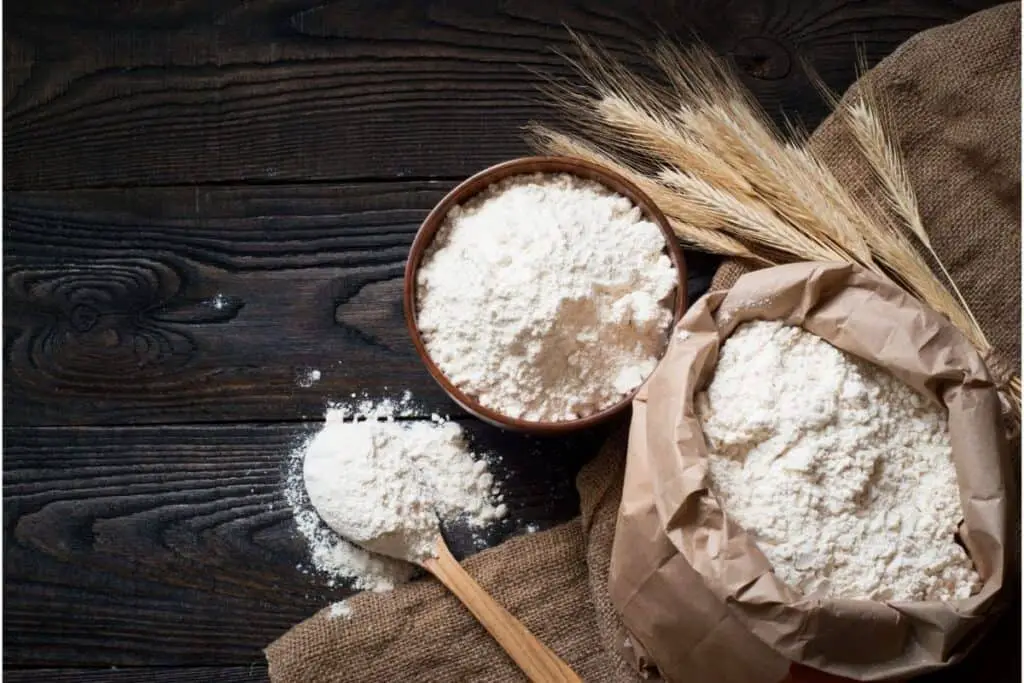Rye flour has become a popular choice for gluten-free baking due to its high protein content and low starch, which makes it less likely to produce dense baked goods.
It is also very versatile in that it can be used as the main ingredient of bread or cakes, or as an addition to other flours such as wheat flour for a more traditional flavor.

When it comes to looking for versatile flour, it can be difficult to know where to start, especially if you don’t know the different types of flour out there.
This post shares everything you need to know about this amazing flour and all that it has to offer.
What Is Rye Flour?
This flour is made from ground whole grain rye berries. It is typically darker than regular white flour because the bran layer on the outside is removed during processing.
The result is flour with a slightly nutty taste and a higher protein content than most other grains. It is said to consist of a slightly starchy consistency when used for baking and cooking. However, it comes highly recommended as a healthy option for flour.
Is Rye Flour The Same As Whole Wheat Flour?
No, it is not the same as whole wheat. This flour is made by grinding whole grain rye berries, also known as whole rye kernels, into flour.
While this process removes some nutrients found in the outer layers of the berry (bran), it does retain the fiber and protein found inside the kernel.
Whole wheat flour is made by removing the bran and germ from hard red winter wheat berries. These are then milled into flour.
Whole wheat flour contains much lower levels of protein and fiber than rye flour as the majority of the nutrients are found in the bran and germ.
There are significant differences between rye and whole wheat flour, since rye flour is made from the end product of the grain, it tends to have a stronger taste than wheat flour.
Also, rye flour is less stable than wheat flour. That’s why when you bake with this flour, you may find that your baked goods tend to crumble easily.
How Is It Made?
The process of making this flour, also known as white rye flour, involves grinding the grain endosperm. Rye flour is made by milling rye berries also known as the rye kernel.
Different types of flour can be made from the grain by implementing different levels of purification such as removing the outer bran coating or using the entire grain.
Purified rye flour is simply the endosperm portion of the grain without any bran or germ added back. In order to remove the bran, the grain must first be steamed.
Steaming breaks down the cell walls of the bran and allows it to separate from the endosperm. Once the bran is separated from the endosperm, the latter is dried and then ground into flour.
Unpurified rye is made by grinding the whole grain or entire rye berries. The bran and germ remain intact and are mixed back into the flour.
Purified rye is usually lighter than unprocessed rye flour which is commonly known as dark rye flour.
Dark Rye Flour
Dark rye is produced using the whole rye grain. This means that both the bran and germ remain intact. The dark color of dark rye flour is caused by the presence of pigments called melanins.
Melanins give this flour its characteristic deep brown color. They are also responsible for giving it its distinctive aroma and flavor.
What Does Rye Flour Taste Like?
This flour is said to offer a strong, hearty, and slightly nutty flavor that effectively adds depth to your baked goods.
If you’re new to baking, try adding a little bit of dark rye to your next batch of cookie dough or cake batter.
You’ll notice how it gives off a rich, deep flavor without overpowering the rest of the ingredients.
Other Names For Rye Flour
This flour is also commonly known as:
- Dark rye flour
- Rye meal
- Whole-grain rye flour
- White rye flour
Can I Make Rye Flour At Home?
Making this flour at home is easy! All you need is a food processor and a few cups of whole-grain rye berries. The process is similar to making any other flour, but you will want to use a food processor instead of a blender.
Making flour at home requires more time and effort than buying it pre-made, however, so it’s best suited for those who enjoy experimenting with their own recipes.
You can buy whole grain rye berries at many grocery stores, health food stores, and online retailers.
Rye Flour Substitutes

This type of flour offers a unique flavor profile that makes it an excellent addition to your baked goods.
It has a distinct nutty aroma and a robust flavor which works well in sweet and savory dishes alike.
However, not everyone has this flour at hand. So, here are some common substitutions:
- Wheat flour
- Spelt flour
- Bulgur flour
- Rice flour
- Barley flour
- Buckwheat flour
All the flours listed above are similar to rye in that they contain high amounts of protein and fiber. They all provide a good base for your baked goods.
Just be careful to avoid over mixing as this can lead to tough baked products.
Nutrition
Rye flour is made from the endosperm portion of the grain. This means that it is very low in fat and calories compared to most other flours.
It also provides a lot of dietary fiber, protein, and B vitamins. Hence, rye is considered to be highly nutritious.
Rye flour’s nutritional profile is as follows:
- Calories 356
- Total Fat 1.6g
- Cholesterol 0 mg
- Sodium 2 mg
- Potassium 381 mg
- Total Carbohydrates 77g
- Protein 11g
- Fiber 12g
- Sugars 1.1g
Is It Healthy?
Yes! It is considered to be one of the healthier flours out there. In fact, it contains more protein and fiber than wheat flour! It is also lower in carbohydrates and sodium.
Therefore, it is considered to be a great source of nutrition.
Is Rye Flour Gluten-Free?
Whilst rye flour is considered to be a highly nutritious choice of flour, it should be noted that it is not suitable for people suffering from gluten allergies.
As rye flour is derived from grains that have been cross-bred with wheat, it does contain small amounts of gluten which makes it unsuitable for people with celiac disease.
Rye contains a gluten protein known as secalin. Secalin is present in rye kernels, but not in the bran layer. When ground into flour, secalin remains intact and is only broken down when mixed with water.
This means that if you are allergic to gluten, you cannot eat this flour because it contains gluten.
Is Rye Flour Keto-Friendly?
Those on a keto diet require a certain amount of carbs each day. Most flour types such as whole wheat and oat bread are considered to be high-carbs.
However, rye flour contains fewer carbohydrates than other types of flour. This makes it ideal for those following a ketogenic diet. Therefore, if you’re looking for a healthy alternative to white flour, then try using this flour in your baking.
How Many Carbs?
On average, there are about 77g of total carbohydrates present in rye flour. This includes both soluble (dietary) sugar and insoluble (starch) sugars.
The majority of these sugars are found in the form of starch which is what gives this flour its distinct starchy and nutty flavor.
Is It Good For Diabetics?

Diabetes is classified as a disease that affects the body’s ability to regulate blood glucose levels. Those who suffer from diabetes must take extra care when choosing their food.
Rye is a type of flour that has a relatively low glycemic index. This means that it will cause a slow release of energy from the body rather than an immediate spike in blood sugar levels.
This allows diabetic patients to better manage their condition by monitoring their blood glucose levels throughout the day. Rye flour is also a great source of protein and fiber.
These nutrients help to keep blood glucose levels steady. Therefore, they are beneficial for diabetics who need to control their blood sugar levels.
Organic Rye Flour
Organic rye is made from 100% pure grain grown without any chemical pesticides or fertilizers. It is free from genetically modified organisms and GMO ingredients.
Organic rye is produced through traditional farming methods that use natural practices to grow crops. This ensures that the soil is rich in minerals and nutrients.
What Can I Make With Rye Flour?
This flour can be used to make a host of baked goods including:
- Bread
- Flatbread
- Cakes
- Pastries
- Pizza dough
- Muffins
- Waffles
Rye flour offers a dense and slightly nutty and sour flavor which makes it a unique addition to many recipes. The options listed only scratch the surface of what can be made using this flour.
Cooking With Rye
Rye flour can be used to make a variety of different foods. It adds a distinctive taste to both sweet and savory dishes. This flour cooks differently from other flours as it does not absorb liquid as other grains do. Instead, it absorbs moisture from the air during cooking.
This results in a chewy texture that works well in bread and pastries. Cooking with rye flour also helps to develop a stronger gluten structure.
This means that the finished product will have more strength and hold together better.
Can You Bake With It?
Rye flour stands to be one of the most popular choices of flour used for baking as it is commonly used as a substitute for white flour and wheat flour due to its unique flavor and structure as it makes for soft bread and light pasta and pie crust.
It is also considered to be a more nutrient-rich option making it an appealing option for baking with and is considered to be responsible for increasing the shelf-life of baked goods in comparison to other flours.
How Long Does Rye Flour Last?
This flour is best stored in a cool dry place away from direct sunlight. If you store your flour in a sealed container then it should stay fresh for up to 6 months.
However, if you store your flour in a sealed container and help it in a refrigerator it can last up to one year if stored correctly as the cold air works to reduce the oxidation process.
Where To Buy Rye Flour
This flour can be brought from local supermarkets or online retailers. There are several places where you can purchase this ingredient such as:
- Amazon
- Whole Foods Market
- Walmart
- Target
- Kroger
- Costco
When it comes to shopping for good-quality rye, it’s important to consider the brand you choose. Some brands may contain additives and preservatives that could affect the nutritional content and quality of the flour.
Look for a high-quality brand that contains no artificial ingredients, flavors, or preservatives. Ideally, look for a brand that contains organic rye.
Takeaway
Overall, rye flour has been proven to be a healthier alternative to wheat flour and is often recommended by nutritionists and dietitians when they want to improve their overall health. It is a versatile ingredient that can be used in a wide range of recipes.
Though considered to be highly nutritious, this flour is, unfortunately, suitable for those with a gluten allergy. However, it is considered to be suitable for those on a ketogenic diet.
So, there you have it… The full guide of everything to know about this flour, what it is, and how it can and can’t be used.
